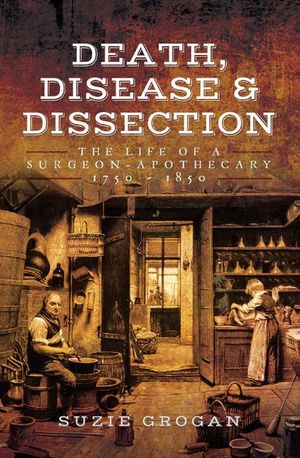Death, Disease & Dissection
Published by Pen & Sword Books
“A deep dive into the education and lives of a medical professional’s life over the span of 100 years . . . A good addition to any medical historian’s library” (The Lazy Historian).
Imagine performing surgery on a patient without anesthetic or administering medicine that could kill or cure. Welcome to the world of the surgeon-apothecary.
During the eighteenth and nineteenth centuries, significant changes occurred in medicine. New treatments were developed and medical training improved. Yet, with doctors’ fees out of the reach of ordinary people, most relied on the advice of their local apothecary, among them, the poet John Keats, who worked at Guy’s Hospital in London. These men were the general practitioners of their time, making up pills and potions for everything from toothache to childbirth.
Death, Disease & Dissection examines the vital role these men played within their communities, their training, the treatments they offered, the quacks, and the shocking sights and sounds in hospitals and operating theaters of the time. Suzie Grogan transports readers through 100 years of medical history, exploring the impact of illness and death and bringing the experiences of the surgeon-apothecary vividly to life.
“I think the author has done a wonderful job of researching the topic and presenting the history of the profession, and biographical information on some of the most influential Surgeon-Apothecaries of the period. . . . This book is well organized and full of fascinating information on the topic.” —A Line from a Book
Imagine performing surgery on a patient without anesthetic or administering medicine that could kill or cure. Welcome to the world of the surgeon-apothecary.
During the eighteenth and nineteenth centuries, significant changes occurred in medicine. New treatments were developed and medical training improved. Yet, with doctors’ fees out of the reach of ordinary people, most relied on the advice of their local apothecary, among them, the poet John Keats, who worked at Guy’s Hospital in London. These men were the general practitioners of their time, making up pills and potions for everything from toothache to childbirth.
Death, Disease & Dissection examines the vital role these men played within their communities, their training, the treatments they offered, the quacks, and the shocking sights and sounds in hospitals and operating theaters of the time. Suzie Grogan transports readers through 100 years of medical history, exploring the impact of illness and death and bringing the experiences of the surgeon-apothecary vividly to life.
“I think the author has done a wonderful job of researching the topic and presenting the history of the profession, and biographical information on some of the most influential Surgeon-Apothecaries of the period. . . . This book is well organized and full of fascinating information on the topic.” —A Line from a Book
BUY NOW FROM
COMMUNITY REVIEWS

